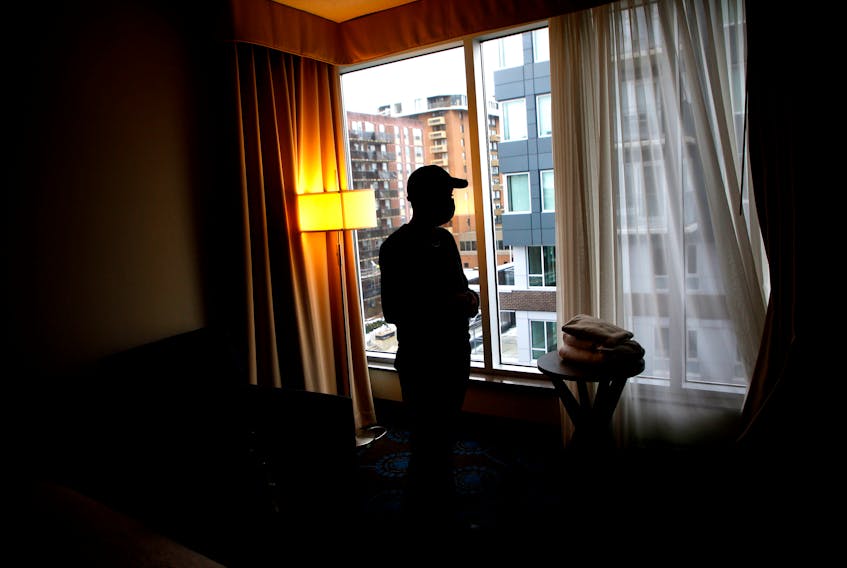It was shortly after midnight when Andy* decided to leave.
Four-and-a-half years into a relationship that started with Andy feeling like he had met his soulmate slowly turned sour over time and only got worse when COVID-19 hit.
As the pandemic left the couple stuck at home and spending more time together than ever before, things became increasingly tense between them — a scenario so common worldwide that the United Nations has started calling domestic violence a "shadow pandemic."
Unprovoked, Andy’s ex-partner started lashing out at him regularly. He would call Andy a “stupid b---h” when he was cleaning or doing other chores around their Halifax apartment.
Andy’s self-worth was dwindling day-by-day.
The abuse was also physical. By this point, Andy’s index and ring fingers could barely move or function because of how many times his ex had twisted and bent them, breaking them several times.

Too common
A national survey from the Ending Violence Association of Canada and Anova documented the impact the pandemic has had on domestic violence survivors as observed by 376 gender-based violence service providers.
From May 18 to July 20, 2020, 46 per cent of gender-based violence staff and volunteers reported changes in the prevalence and severity of violence experienced by survivors, with 82 per cent of these workers describing an increase in prevalence and severity of violence.
Whenever Andy, who is deaf and lives with low vision, contacted the police for help, he wasn’t able to communicate as well as his ex could, so ”the situation always sort of ended up in his favour in the end,” said Andy, who is beginning his transition and uses he/him pronouns.
According to Statistics Canada’s 2014 General Social Survey on Victimization, women with a disability were twice as likely as women who did not have a disability to be a victim of violent crime.
A similar trend was evident among men.
The survey also found that Canadians with a disability were more likely to be victimized in their own home, as close to one-third of violent incidents against a person with a disability occurred in their private residence.
Cooped up together at home, Andy’s ex-partner also pushed him to use drugs.
“I think that he was feeling much more stress, and then I was feeling much more stress, and I’ve never used drugs, and then in the end of all of it, he was just pushing and pushing and pushing,” Andy said, speaking through an interpreter in a Halifax hotel room.
“It ended up being that I ended up using. And he forced that on me."
When Andy realized his ex was cheating on him and stashing hard drugs around their apartment, it all got to be too much.
He’d had enough.

‘I'm finally feeling safe’
A few weeks ago, Andy texted his father and asked for some money — just enough for a cab ride out of there.
Up until then, he was scared to leave because his ex “threatened my life,” Andy said, adding, “I was worried for my safety, so I felt like I didn’t have a choice or anywhere to go.”
Leaving in the dead of night wasn’t ideal because of his disabilities, he said, but Andy knew it had to be done.
He spoke to his landlord about needing “emergency relief” and was able to break the lease on his apartment without a penalty.
As a single parent who no longer has contact with his 12-year-old daughter’s biological father, Andy also arranged for his daughter to stay with a friend for the time being.
He then packed a suitcase and a couple of bags, got in the taxi, and left.
“I managed to get out of there just as he was ready to show up, so I managed to get the clothing I have with me and some jackets for the wintertime — just what I needed to survive,” he said.
First, Andy went to Bryony House, an emergency shelter for women with or without children escaping intimate partner violence, but his ex found out he was there.
Later that night, he went to Barry House, an emergency shelter for women, trans and non-binary individuals who are experiencing homelessness.
Andy said Barry House “wasn’t really safe with my loss of vision,” because there were so many people there, so he gathered his things and went to a Halifax hotel, where he’s currently living.
His daughter, who Andy calls his “pride and joy,” has visited him a few times since and told him how much happier he looks after leaving his abusive partner.
Andy said the staff at Barry House “were really helpful” and contacted Adsum for Women & Children to arrange for him to move into an emergency apartment with his daughter. He’s planning to move into the new place this month.
“Hopefully, I’m heading in the right direction. I do feel happy that I’m finally feeling safe,” he said, adding he has been accepted into a school and is hoping to become a social worker specialized in addictions and mental health issues.
Since leaving the “dangerous and violent” relationship, Andy has also started to explore his identity.
“I’ve started trying to love myself more and I’ve decided that I think that I’m transgender and I’m still sort of exploring that. It's just a lot that’s happening at the same time, so I’m just sort of confused at this time,” he said.
Advice for others
Having left his abusive relationship and come this far, Andy, who also deals with mental illnesses daily, said he feels “much more free than I was, less worried, less sensitive, less anxious and jumpy and all these things.”
Others can do it too, he said, but a plan is key.
“Make a plan with your friends or family, so that they can help you, and have things ready, have resources ready, maybe have a place to go to, take some money out of your account so you have some money to run with. If you’re able to involve police, then do that as well,” he said.
But Andy suggests people “try to get out” before things get to be dangerous in a relationship.
If you notice any “yellow flags” or “cautions that are slowly building” in your partner, such as bullying, nagging, or doing anything rough like grabbing your finger and squeezing or twisting it, take note, Andy said, because it could all “turn to red flags eventually.”
He also recommends looking into resources available for people escaping intimate partner violence, offered by organizations like Bryony House, Barry House and Adsum for Women & Children, and even local Facebook groups for support.
Andy has particularly leaned on one Facebook group whose members have helped him both emotionally and financially, offering him food, clothes, and hygiene products throughout his journey.
“I’m not sure what I would’ve done without the people at Barry House or what would’ve happened to me without that support,” he said.
In the end, Andy wants to share his story so that other victims of domestic violence feel like they’re not alone and that there’s hope.
“Anyone can get out. It’s never too late.”
* The survivor’s name has been changed to protect their identity.
Resources for people experiencing domestic violence
- If you are in immediate danger, call 911.
- If you are a woman or her children experiencing violence and abuse in Nova Scotia, contact a shelter near you for crisis support or emergency shelter through thans.ca. In the Halifax Regional Municipality, contact Bryony House at their distress line by phone or text message at 902-422-7650, the main shelter number at 902-423-7183 or email [email protected].
- If you are a man experiencing violence and abuse in Nova Scotia, contact Shelter Nova Scotia for emergency shelter at 902-406-3631.
- If you are a man who has been abusive and would like to stop the violence, please contact your nearest Men's Intervention Program.
- If you are a child or teenager, and need to contact Kids Help Phone, please call 1-800-668-6868 or visit KidsHelpPhone.ca.
- If you are a tenant facing domestic violence, you can end year-to-year or fixed-term leases early without financial penalty. For more information or to begin the process of ending a year-to-year or fixed-term lease, call Victim Services at 1-888-470-0773.
- If you need crisis services, call or text 211 or the toll-free number, 1-855-466-4994.
Other resources:
P.E.I. Family Violence Prevention Services
NL Sexual Assault Crisis and Prevention Centre









